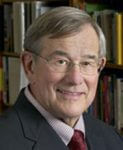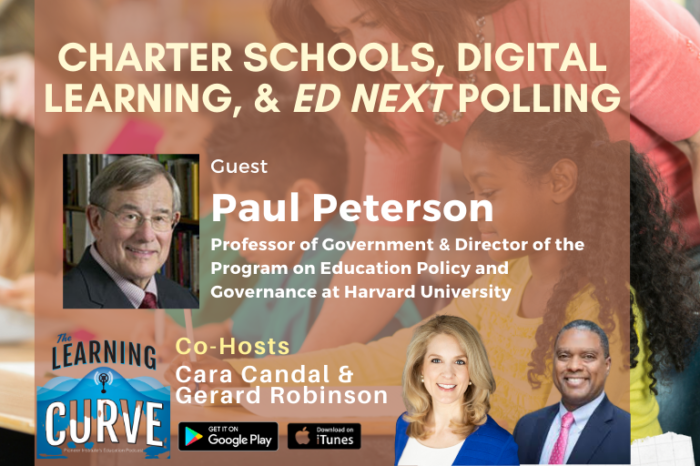Harvard PEPG’s Prof. Paul Peterson on Charter Schools, Digital Learning, & Ed Next Polling
This week on “The Learning Curve,” Cara and Gerard are joined by Paul Peterson, the Henry Lee Shattuck Professor of Government and Director of the Program on Education Policy and Governance at Harvard University. They discuss his recent Wall Street Journal op-ed analyzing NAEP results from 2005-17 to show that charter schools are helping underprivileged students improve at faster rates than their peers in traditional district schools, especially among African-American students. Professor Peterson shares thoughts on the implications of this evidence for charter school expansion, and the challenges from opponents, predominantly in the Northeast, who seek to over-regulate charter schools. They also delve into lessons from COVID-19 with regard to the long overdue embrace of online education, options such as micro-schools and pods that are unfortunately often only available to affluent families, and the effects of school closures on children.
Stories of the Week: In Boston, attending a charter school dramatically narrows achievement gaps between special-education students and English learners, and their traditional public school counterparts, according to new analysis from Tufts Professor Elizabeth Setren. In Kansas, the Education Commissioner stated that both remote and hybrid learning models are not effective and sustainable through the academic year.
Guest
 Paul E. Peterson is Henry Lee Shattuck Professor of Government and Director of the Program on Education Policy and Governance at Harvard University, a Senior Fellow at the Hoover Institution, and the Senior Editor of Education Next: A Journal of Opinion and Research. He has evaluated the effectiveness of school vouchers and other education reform initiatives. He is author or editor of numerous books, including Saving Schools, which documents the forces that undermined the effectiveness of a once dynamic educational system. His recent book (with Eric Hanushek and Ludger Woessmann), Endangering Prosperity: A Global View of the American School, documents the large economic costs of a stagnant K-12 education system. He serves as a member of Hoover’s Education Success Initiative (HESI) focusing on the improvement of education policy and providing public education solutions for state education and policy leaders.
Paul E. Peterson is Henry Lee Shattuck Professor of Government and Director of the Program on Education Policy and Governance at Harvard University, a Senior Fellow at the Hoover Institution, and the Senior Editor of Education Next: A Journal of Opinion and Research. He has evaluated the effectiveness of school vouchers and other education reform initiatives. He is author or editor of numerous books, including Saving Schools, which documents the forces that undermined the effectiveness of a once dynamic educational system. His recent book (with Eric Hanushek and Ludger Woessmann), Endangering Prosperity: A Global View of the American School, documents the large economic costs of a stagnant K-12 education system. He serves as a member of Hoover’s Education Success Initiative (HESI) focusing on the improvement of education policy and providing public education solutions for state education and policy leaders.
Tweet of the Week
MEDIA ADVISORY- CREDO at Stanford to release estimated learning loss research – https://t.co/jlPeagpxHc
— CREDO at Stanford (@CREDOatStanford) October 1, 2020
News Links
Education commissioner: Kansas schools must find better solution for remainder of school year
A Charter Boost for Special-Ed Students and English Learners
The next episode will air on Wednesday, October 14th, 2020 at 12 pm ET with Cheryl Brown Henderson, President of the Brown Foundation for Educational Equity, Excellence, and Research. Her father, the Rev. Oliver L. Brown, was a lead plaintiff in Brown v. Board of Education.
Get Updates on Our Education Research
Recent Episodes:




















